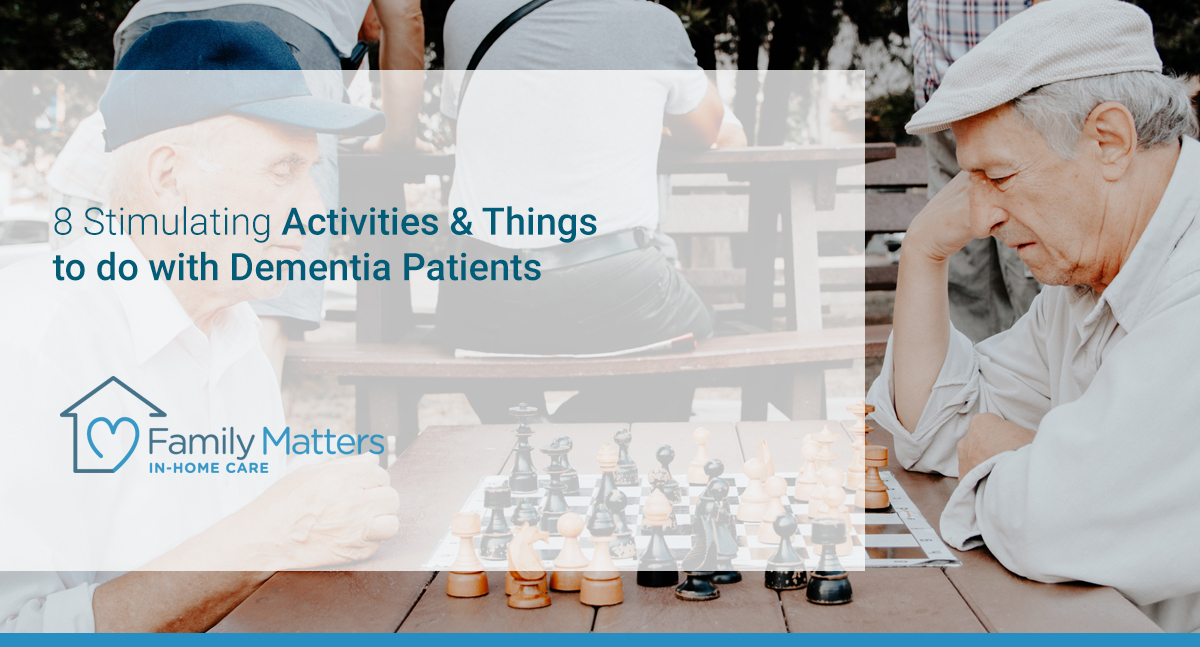
8 Stimulating Activities & Things to do with Dementia Patients
Dementia impacts millions of families every year. The condition can be difficult to navigate, but that doesn’t mean dementia patients should be left without active lives. They can still participate in many activities and stay engaged.
Family members and friends can take a role in ensuring their loved ones still have an opportunity to connect and stay involved. Start with these eight stimulating activities and fun things to do with dementia patients.
- Listen to Music
- Afternoon Tea
- Baking or Cooking
- Puzzles
- Use Technology to Travel
- Read Together
- Play a Game
- Visit a New Place
1. Listen to Music
Music can elicit many positive emotions from seniors with dementia and can be a great way for them to bond with younger generations.
Some researchers believe that music is one of the strongest stimuli attached to memories. Listening to an old favorite song can bring back memories or fragments of memories, even if just momentarily.
Find an old favorite soundtrack or try something new. You may even inspire a dance or sing-along session, which can be therapeutic and boost mood and mental health.
2. Afternoon Tea
Afternoon tea is a simple but fun way to pass the time together. Dementia patients can try different types of tea and join in good conversations with friends and family.
Tea can be as simple as a single teapot or as intricate as a multipiece tea set with food accompaniments. Spending quality time over tea doesn’t take a lot of effort, but it can be one of the best things to do with dementia patients.
3. Baking or Cooking
Spending time baking or cooking can be one of the most stimulating things to do with dementia patients. Reading recipes and following instructions is a simple but effective exercise for the brain.
Family members, friends, or caregivers can try a new recipe — or follow an old family one. Best of all, after a day of baking or cooking, dementia patients will have a meal or treats that they can enjoy.
4. Puzzles
Even those who experience confusion and memory problems should continue to challenge their minds. An easy way to exercise the brain is through puzzles. These are just a few examples of puzzles that dementia patients can engage in:
- Jigsaws
- Crosswords
- Logic puzzles
- Word searches
- Pattern-guessing games
- Riddles
Puzzles are not just a fun way to pass the time; they also test the mind and keep it active.
The puzzles don’t have to be too difficult. Solving simple problems is a good way for dementia patients to engage their minds with minimal risk of getting frustrated or discouraged. In fact, completing a puzzle can boost their confidence and give them a sense of accomplishment.
5. Use Technology to Travel
Travel can become difficult for patients with dementia, particularly in the late stages. However, someone who cannot travel physically can still see the world. With today’s technology, there are more opportunities than ever to explore new places from home.
Many of the world’s most famous monuments have live cameras or video tours available for free. Take the time to explore cities and sites with virtual tour options. Through technology, a person with dementia can still satisfy a craving for adventure without having to leave the house.
6. Read Together
Dementia patients are likely to have bad days and good days when it comes to reading. Even on bad days, books should not be off-limits to them. Friends, family members, and caregivers can read along with seniors or even read to them out loud.
Books are a wonderful way to learn new things, escape into a story, and be entertained. Reading is also a good way to exercise the mind and stay intellectually engaged.
7. Play a Game
Playing games can be one of the most stimulating things to do with dementia patients. Following the rules may be more difficult some days than others, but simply participating can be a good yet gentle exercise for the mind. Types of games that patients with dementia might enjoy include:
- Checkers
- Dominoes
- Charades
- Jenga
- Go Fish
- War
- Battleship
There are also a variety of card games that can be fun for seniors with dementia. You can even make up your own card game with easy-to-remember rules.
8. Visit a New Place
Dementia patients often experience ups and downs. Visiting a new place is a good way to boost their mood and give them something exciting to look forward to. Consider visiting a local museum or historical site to learn something new. You can also explore a nearby town or just go for a drive.
Stay Creative in Keeping Dementia Patients Active
Caring for patients with dementia can be challenging, and the condition can be unpredictable. However, dementia patients can still live an active lifestyle and participate in a variety of events.
With a little creativity, you can think of many things to do with dementia patients and do your part to ensure they continue to experience a high quality of life.
If you or your family member is considering in-home care as part of a plan to age in place, contact Family Matters In-Home Care today for a free consultation. Our team is dedicated to supporting your family and helping older adults enjoy life in the comfort of their own home for as long as possible.
Some of the services offered by Family Matter In-Home Care include: Alzheimer’s & Dementia Care, Bed & Wheelchair Transfer Assistance, Companionship, Housekeeping & Meal Preparation, Personal Care, Recovery Care, and Transportation.
Serving the San Francisco Bay Area and Greater San Diego, Family Matter In-Home Care has offices throughout California including: Campbell, CA, Roseville, CA, San Marcos, CA, and San Mateo, CA.
